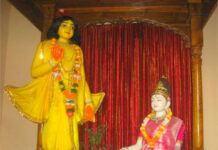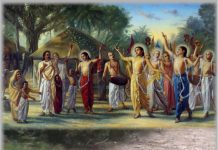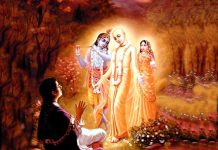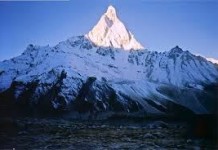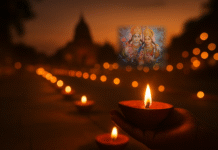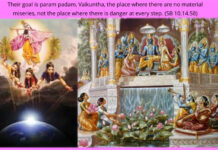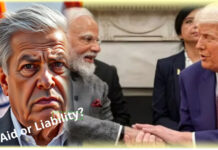In India there is a considerable misunderstanding about Lord Shiva. So much so that people with poor fund of knowledge, claiming themselves to be saints or spiritual leaders, say that shiva is just a purified stage of consciousness and that we can all become shiavs. Some even depict him as a mere symbol of good sentiments.
I was shocked, a few days back, to read a text forwarded to me by a well-meaning friend wherein the writer tries to justify Lord Shiva’s different attributes like the snake around his neck, his holding a trident, his carrying the damaru (a musical instrument), his supposedly blue complexion and so on. While I don’t blame the writer’s intention, myself being an aspirant of Lord Shiva’s mercy and having learned about him from bona fide Vedic scriptures, I feel duty-bound to say that such explanations simply misguide innocent public.
The purpose of this article is not to establish anyone’s supremacy as the Supreme Lord does not require arguments to be established in His position. The supreme will remain supreme regardless of what people think and talk about Him. The purpose of this article is to discuss the personality of Lord Shiva.
Since understanding Lord Shiva is not a small subject matter, I would like to touch only a few essential points here showing who Lord Shiva really is and how he is not just a mere imagination. He is a real person with real attributes and responsibilities in the universal affairs. For example, he has performed many inconceivable feats, like letting the personality of river Ganga descend on his famous Jata (matted hair on the head) along with her immensely forceful celestial waters duly sanctified by the touch of Lord Vishnu’s lotus feet, and he was the one who consumed the halahal poison that came out of the celestial ocean during the famous sumudra manthan.
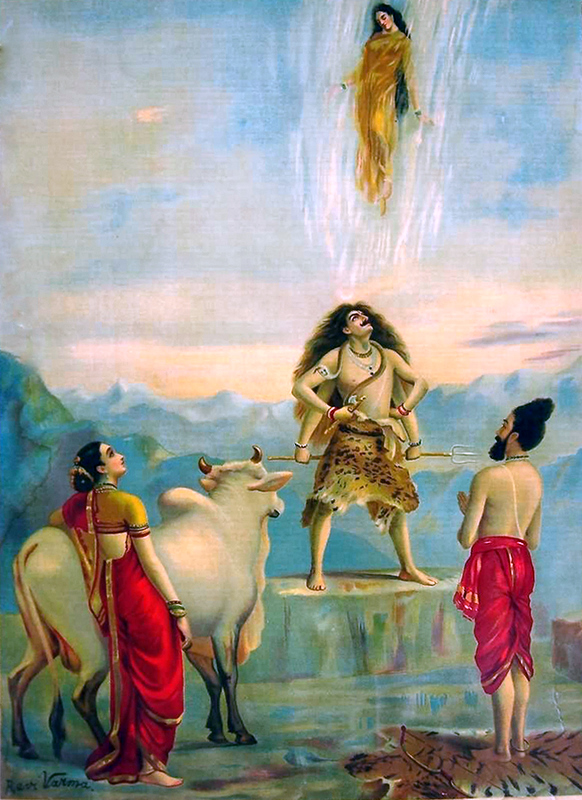 The difficulty with modern people is, they are not only confused about God, His various incarnations and energies, but are either over confident or hopeless about their views on spiritual realities. They are taught to discard anything that doesn’t fit in their limited intelligence. No surprise they call our scripture mythology. That’s what people have been learning since our English friends ruled India, and most of them are still suffering from that influence. As mentioned in my article Ma Durga – Going beyond myths, calling Vedic history mythology is the biggest myth of the world till date,
The difficulty with modern people is, they are not only confused about God, His various incarnations and energies, but are either over confident or hopeless about their views on spiritual realities. They are taught to discard anything that doesn’t fit in their limited intelligence. No surprise they call our scripture mythology. That’s what people have been learning since our English friends ruled India, and most of them are still suffering from that influence. As mentioned in my article Ma Durga – Going beyond myths, calling Vedic history mythology is the biggest myth of the world till date,
When we want to know about a particular company, the best source is the owner, or his close ones. We cannot manufacture our own views nor can such views be accepted by those who know the company well. Similarly, when we want to know about someone, the best source is the person himself or his close ones. Unfortunately, when it comes knowing God and His management structure, all that we hear these days is concoctions. To add to this, many so-called religious leaders give their own opinions and promote philosophies found nowhere in the authorised Vedic scriptures. And when they cannot satisfactorily explain the existence and personality God, they say that God is just a concept, we are all gods, none is god, everything is god, and all such unfounded statements.
When we want to know about God and His multifarious energies, we have to hear from Him or from the knowledge He has given in Vedic scriptures. Not only that, such knowledge must be received through a bona fide spiritual master or guru. If someone questions that why one must accept a guru, the answer is, because that is how God chooses to be known. He is fully independent and can also choose another way at His sweet will.
Note: An updated version of this article is published at http://mayapurvoice.com/svagatam/lord-shiva-myth-master
If you are ready to hear from such a spiritual master, the following is an extract from a morning walk conversation with His Divine Grace A.C. Bhaktivedanta Swami Prabhupada, the founder-acharya of ISKCON, that took place in Mauritius, on October 5, 1975. If you are not yet ready to accept this easy-to-understand explanation, you can still read it and go to the text that follows the conversation. He is responding to queries about Lord Shiva’s position.
Indian man : Swamiji, is Shiva not another name of God?
Prabhupada: Yes. Shiva is next to God. Just like yogurt, dahi. You know dahi? What is this dahi? Milk. But it is not milk. Dahi is nothing but milk, but it is not milk. Similarly, Lord Shiva is nothing but Vishnu, but it is not Vishnu. Is it clear now? You can say, “Well, dahi is nothing but milk.” Yes. But it is not milk. If instead of milk you take dahi, the result will be different. And if you take milk instead of dahi, that is…, that will be different, even though the milk and dahi is the same thing, same ingredients. So you have to understand in that way. Lord Shiva is nondifferent from the Supreme Lord. Everyone is nondifferent from Supreme Lord, but he’s still different. This is the perfect philosophy, acintya-bhedabheda, simultaneously one and different.
Indian man : Swamiji, in all the temples in Mauritius, the supreme deity…
Prabhupada: Supreme Deity is Vishnu.
Indian man: But we consider Lord Shiva to be the supreme deity because we…
Prabhupada: But that is your lack of knowledge. I have already explained that, that yogurt is not different from milk. It is milk but still, it is not milk. You have to understand like that. Lord Shiva is not different from Vishnu, but he’s still not Vishnu.
Indian man: No, but do we offer the prayer first to Shiva…?
Prabhupada: That you do. There is no harm. Lord Shiva is also called Mahadeva. Amongst the demigods, he is the chief. So if you worship Lord Shiva… We also worship Shiva. It is not that we disrespect Shiva. We offer our utmost respect to Lord Shiva. But that does not mean that he is the Supreme Lord.
Indian man: The difference that is there, Swamiji…
Prabhupada: Difference I have already explained. You cannot understand?
Indian man: No, no, we pray to Shiva first and then we pray to Krishna.
Prabhupada: So that you do. There is no harm. There is no harm. But you should understand who is Shiva and who is Vishnu. If you offer first prayer to Lord Shiva, there is no harm. It is good. He is… vaisnavanam yatha sambhuh. He is our spiritual master. He is Vaisnava. Why not offer first respect to him? But if you take Lord Shiva as the Supreme, that is insult. You are giving me respect as spiritual master, but if you give me overestimation, that “You are the king of the whole world,” that is insult. That is not prayer. If you offer me prayer as I am befitting, then it is all right. But if you give me prayer for which I am not befitting, that is insult. So you must know what is the position of… Lord Shiva is a Vaisnava. He is the greatest devotee. He is the number-one demigod, and everything is all right. But if you say that he is the Supreme, then he will feel insulted, that “what is this nonsense saying?” So don’t insult him in that way. That will go against your credit. He doesn’t like that.
Here is the point: People in general, including majority of the present day sadhus and religious leaders, have a very vague or no idea about what is God or Bhagavan and what is demigod or Devatas.
Parasara Muni, a great sage and the father of Vyasadeva, who compiled all the Vedic literatures, gave the following definition of God:
Bhagavan, the Supreme Personality of Godhead, is thus defined by Parasara Muni as one who is full in six opulences—who has full strength, fame, wealth, knowledge, beauty, and renunciation. (To know more about this subject matter you may refer to http://harekrishna.com/col/books/SRE/SSR/def-god.html)
Devatas, or Devas, are the appointed representatives of the Supreme Lord, or Bhagavan. Lord Shiva is called Mahadeva, meaning the chief among the Devas. Whenever Lord Shiva or other demigods are addressed as Bhagavan, it is to be understood that they are, in some ways, 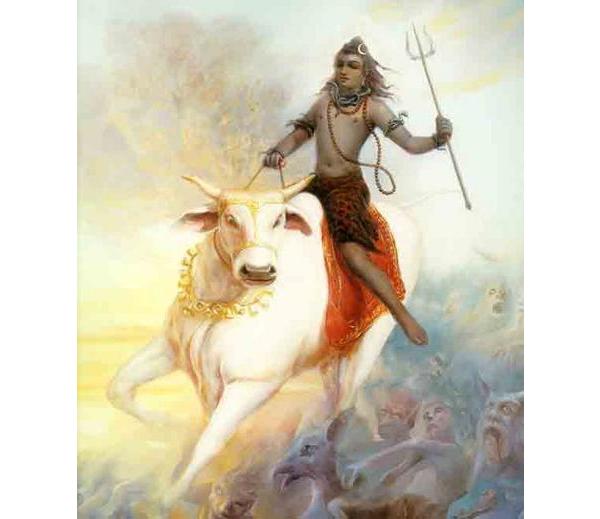 expansions or parts and parcels of the Supreme Lord. It is like we can say we are all Isvaras because the word “Isvara” or “Ishvar” means a controller. We all could be considered controllers of our own little world but we are also controlled by other higher beings. That is why the scriptures talk about Paramesvara, meaning the supreme controller who is not controlled by anyone else.
expansions or parts and parcels of the Supreme Lord. It is like we can say we are all Isvaras because the word “Isvara” or “Ishvar” means a controller. We all could be considered controllers of our own little world but we are also controlled by other higher beings. That is why the scriptures talk about Paramesvara, meaning the supreme controller who is not controlled by anyone else.
Those who have scrutinizingly studied Vedic literatures in this regard will have no doubt that Lord Shiva is an expansion of Lord Vishnu, who Himself assumes the form of Lord Shiva for the purpose of dealing with material nature. In other words, it is Vishnu who expands into Shiva, not the other way around, and that shows the positions of and difference between Lord Visnhu and Lord Shiva. Brahma-samhita compares (see below) their positions with milk and yogurt respectively. Milk can turn into yogurt but yogurt cannot turn into milk. Just as milk is the source of yogurt, Lord Vishnu is the direct cause of Lord Shiva’s eternal existence.
Shiva is neither an ordinary living entity, jiva, nor a typical demigod. He is in his own category of existence, known as shiva-tattva. He is almost on the level of Vishnu, but because of his interaction with material nature he is not counted as vishnu-tattva, the category of Godhead.
The first tier of universal management consists of three executive heads: Brahma, Vishnu, and Shiva. Each is such a powerful controller that they are sometimes given equal status within Vedic literature—and inaccurately called “the Hindu Trinity” by Western scholars. The Srimad-Bhagavatam explains that Vishnu is God, or a full expansion of Krishna, whereas Brahma is a finite soul, and Shiva is in a category of his own, slightly less than God. Both Brahma and Shiva are servants of Vishnu, empowered by Him for universal work.
Working under these powerful controllers are many demigods, or devas, empowered to fulfill universal duties. As departments within a city government manage the delivery of water and electricity, the devas oversee the material world.
We should not mistakenly worship the devas as God. We are indebted to them, but they supply life’s necessities on God’s behalf using His energies, and we can pay our debt to them by worshiping Him. By satisfying Krishna, all His servants are satisfied.
Shaivites, however, tend to see Shiva not just as the greatest devotee but as God Himself. There is some basis for this in scripture. In the Bhagavatam (4.7.50) Lord Vishnu Himself says, “Brahma, Lord Shiva, and I are the supreme cause of the material manifestation. I am the Supersoul, the self-sufficient witness. But impersonally there is no difference between Brahma, Lord Shiva, and Me.”
In other words, all three divinities are one because they are all avataras, or descents of the Supreme, for the creation, maintenance, and annihilation of the material world. In this context, they are known as guna-avataras, and they preside over the modes of passion (embodied by Brahma, the creator), goodness (embodied by Vishnu, the maintainer), and ignorance (embodied by Shiva, the destroyer). All three of these avataras are considered aspects of the same principle of Godhead.
The Mahabharata too (Anusasana-parva 135) says that Vishnu and Shiva are nondifferent and even counts the names Shiva, Sarva, Sthanu, Isana, and Rudra—names traditionally identified with Shiva—among the thousand names of Vishnu. Such identification between Shiva and the Supreme Lord seemingly gives weight to the idea of contemporary Hinduism that all the gods mentioned in the Vedic literature are one.
But a close study of scripture shows that while there is reason to see Shiva as nondifferent from Vishnu, there is also reason to distinguish strongly between them. According to Bhagavad-gita, which is accepted by nearly all classes of transcendentalists in India—including Vaisnavas and Shaivites—Vishnu (Krishna) is the ultimate Godhead, to whom even Shiva must bow down. This is not a matter of opinion or sectarian prejudice. Krishna identifies Himself as the source of all material and spiritual worlds ( Bg. 10.8), and Arjuna confirms that Krishna is indeed supreme (Bg. 10.12). Krishna is “the God of all the gods” (devesa, Bg. 11.37).
In countless incidents from the Puranas, Shiva is clearly seen to be Vishnu’s devotee. For example, there is the story of Vrkasura, a demon who practiced severe austerities and then asked Shiva for a boon—the power to kill at once any living being whose head Vrkasura would merely touch. Shiva granted the boon, but was soon to regret his decision, for Vrka came after him to try out the newfound power. Lord Shiva ran to all parts of the universe to escape this power-mad devotee and finally ended up at the door of the kingdom of Vishnu.
Shiva is superior to Brahma, who is an empowered soul (jiva), but Shiva is not quite on the same level as Vishnu. It is therefore said that Shiva is a unique living being who merits his own category, known as Shiva-tattva.
To clarify Lord Shiva’s position, the Brahma-samhita (5.45) offers an analogy: “When milk is transformed by acids into yogurt, the yogurt is neither the same as nor different from the milk. I adore the primeval Lord Govinda [Krishna, Vishnu], of whom Lord Shiva is a transformation for performing the work of destruction.”
Though milk and yogurt are essentially nondifferent, yogurt is a product of milk. One can use milk to make ghee, cheese, ice cream, or yogurt, but one cannot turn yogurt into milk. Clearly, then, Shiva’s divinity is intimately connected with, even dependent upon, his relationship to Vishnu.
Srila Prabhupada comments, “Lord Shiva is important because he is holding on his head the holy Ganges water, which has its origin in the footwash of Lord Vishnu.
There are other forms of Shiva worship as well, but the only authorized form comes down in the Rudra Sampradaya, also known as the Vishnusvami Sampradaya, an authorized Vaisnava lineage in which Shiva is worshiped as the greatest devotee of Vishnu. Its adherents say that ultimate liberation comes from devotion to Vishnu. And Shiva, they say, showed how to be the perfect devotee. Even Shiva himself confirms that one can achieve the supreme destination only by the mercy of Vishnu. Lord Shiva says, mukti-pradata sarvesam Vishnur eva na samsayah: “There is no doubt that Vishnu is the deliverer of liberation for everyone.” Source Shiva | Krishna.com
It is the causeless mercy of Srila Prabhupada and the previous acharyas that today we are able to understand the actual position of Lord Shiva and offer our respects to him accordingly. Being in charge of the mode of ignorance, Lord Shiva is also the master of false ego in all living entities and as such it is Lord Shiva by whose mercy one can finally get relieved from the clutches of false ego and achieve permanent shelter at the lotus feet of Lord Sri Krishna, the Supreme Personality of Godhead. That will please Lord Shiva the most. Hare Krishna.


